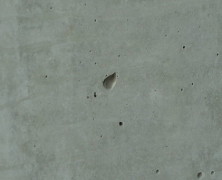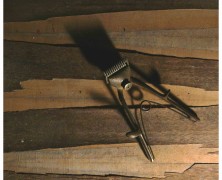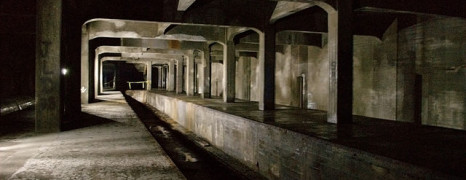Emily Zhang’s “History of Navigation” received third place in the 2015 Glazner Prize for Creative Writing contest, sponsored by SFUAD’s Creative Writing and Literature Department. On Atlantic Street a girl lies on the street with vultures in her throat, the moon melting into the eggshell of her eyes melting into me. I don’t know if she swallowed the sky or if the sky swallowed her, but she is spilled like a run on sentence, preserved in past tense and the holy glow of streetlight. An exercise in forbearance. Two months after my grandfather said the name of what would kill him, we spilled salt on our tongues and drank soup too sparse to be unstill. My uncle drove without a seatbelt swathed across his shoulders. He drove until he saw a lake that wrapped its fingers around the sky’s neck and exhaled while the sky inhaled. Until he saw a bird and tried to catch it, but its wings broke off when he grazed it, and he closed his palms over its eyes and pressed, learned that he couldn’t protect anything anymore. Six years ago a man on the telephone told her to put her hands between her thighs and squeeze and she told him nothing. A ritual in reverse. All I know is that we all have the animal want in our stomachs to float, that they are burning newspapers on Atlantic Street now. When the universe was first beginning a bird took a flashlight from a trashcan and dropped it into a beautiful coffin. In five hundred years someone will unearth this moment without the girl, in the wicked heat of June, tucked in concrete like an exhalation. I wish I...
“Hair”
posted by admin
“Hair” by Joseph Jordan-Johnson received second place in the 2015 Glazner Prize for Creative Writing contest, sponsored by SFUAD’s Creative Writing and Literature Department. Roots I have my father’s hairline. A widow’s jut in the middle of my forehead. I have naps—scalp clumsy. His waves were smooth, current-cut, razor-precise. He never told me how he keeps the gray from creeping in. He is 53, a silver fox smile cutting from ear to ear. My scalp is too oily, lacquered, pore-thick. My hair runs bristle wired, strung, dry and clumped. I have ignored how he taught to keep it clean. Cut They are rigored, the coroner’s faint clipper buzz is a lullaby. There seems to be less hair on the floor each time I cut, less tufts to sweep, less bodies to hide. Shower It is hot, in the way that pain cries. Holy, in God’s new breath, it is His steam that will bring more wrath than Murray’s wave gel, the things my father always used. The things I learned to hate. Shave More scratch than bite— less rough along the grain. The basin of the tub runs black and red, nicks of hair crawling to the drain. I hear them howl, there is wrath in each pull each razor-tear each pore less bloody than the other. They are him, not His. Dry Fresh. Something God has assumed. Something only death can say. I am bulbous, not whitehead, not ready to pop. There are years I have shaved– fifty-three bags all in a pile. The buzz has stopped. The wrath looks less bloody. The zipper closes. Joseph Jordan-Johnson is a senior at...
“Portrait of a City”
posted by admin
“Portrait of a City” by Alexandra Spensley received first place in the 2015 Glazner Prize for Creative Writing contest, sponsored by SFUAD’s Creative Writing and Literature Department. Part I: Streets & Avenues The city receded like tidewater, brackish. I watched it slide. Metal accepted metal in a blur of ticking steel, urban heartbeats. Sidewalks swallowed themselves: unclean tongues roving through a city scorched sideways. Who will shoulder this weight? I am left with empty husks, the shadows of buildings ashen as roman carpets. Alone, I map my way through the rubbish: slabs of stone, loose teeth, a child’s violin splayed open and bleeding, red-eyed mice twisting in its hollow chest. I hung the city like wallpaper, then tore it in two— and it was not stitched from a paste of broken stars, not submerged in the hot sways of red dresses— no, the city was a cut-glass mobile, enthralling, suspended above a child’s eager hands. Part II: Harvests We knew we were done for when the newspaper said one-fourth of the houses in the eastern district now stood vacant, empty monuments to the past. That same newspaper had voted us best hardware store in the city for three nonconsecutive years—we had their dates on a plaque in the frosted-glass window out front—but who needs a hardware store when there’s no houses left? I started rearranging things. I moved the Phillips screwdrivers to aisle four and put most of the auto parts by the cash register. Nothing worked except positioning the blue paint-thinner jars in front of the window; this spiked sales for a few weeks before my conscience made me move everything back. Soon nearly everyone who came in was trying to tune up their cars for the long drive to a new house, buying gallon jars of oil and gas or trailer hitches for U-Hauls. When I asked them where they were moving to, they all mumbled something along the lines of “Oh, Barb and I are headed west” or “We’re taking the kids up north for high school”—indiscriminate, vague substitutes for “anywhere but here”. Outside, foreclosure signs sprouted like poppies in a pasture. Outside, the rain started. I thought we could struggle by on what we’d saved up from the good years, but when the generator busted ($5,000) and the roof started leaking ($6,000), I had no choice but to close the place down. I used all of our meager revenue from the past four months printing out huge black-and-red EVERYTHING MUST GO signs, hung them out front next to the posters of angry-eyed kids with ‘missing, desperacido‘typed in block letters on top. There were dozens of those missing posters—I pasted each one I found; I just couldn’t stand those kids’ eyes. My wife suggested that we move out after closing shop, let our house become another shuttered tomb in the sea of a dying city. I told her no, I couldn’t release this land after so many years of holding it— so long that it had bloomed roots around my tired wrists. Still, the sight of the grocery on Sunday pierced me: washed-out high school kids, coughing up cigarettes in the parking lot; shelves heavy with a lack of bread; the thick, tangible seep of money right into the greedy earth. Gone. In the end, we couldn’t sell everything in the shop and drove it to the town dump instead; we needed three full pickup beds to move it all. Paradoxically, the dump seemed to be the liveliest place in the city: laughing, tanned men in cutoff shirts, cheerily tossing mountains of metal screws and power drills into the gaping tongue of a trash compressor. The leather of the pickup’s passenger seat stuck tight to my thighs; soon, summer would be here. In the rearview mirror, I watched the men heave trash bags over their shoulders like insect cocoons full to bursting, like a reaping of...




 Jackalope Magazine is the student magazine of Santa Fe University of Art and Design. Building on the interdisciplinary nature of our education, we aim to showcase the talent of our university and character of our city.
Jackalope Magazine is the student magazine of Santa Fe University of Art and Design. Building on the interdisciplinary nature of our education, we aim to showcase the talent of our university and character of our city.
Recent Comments